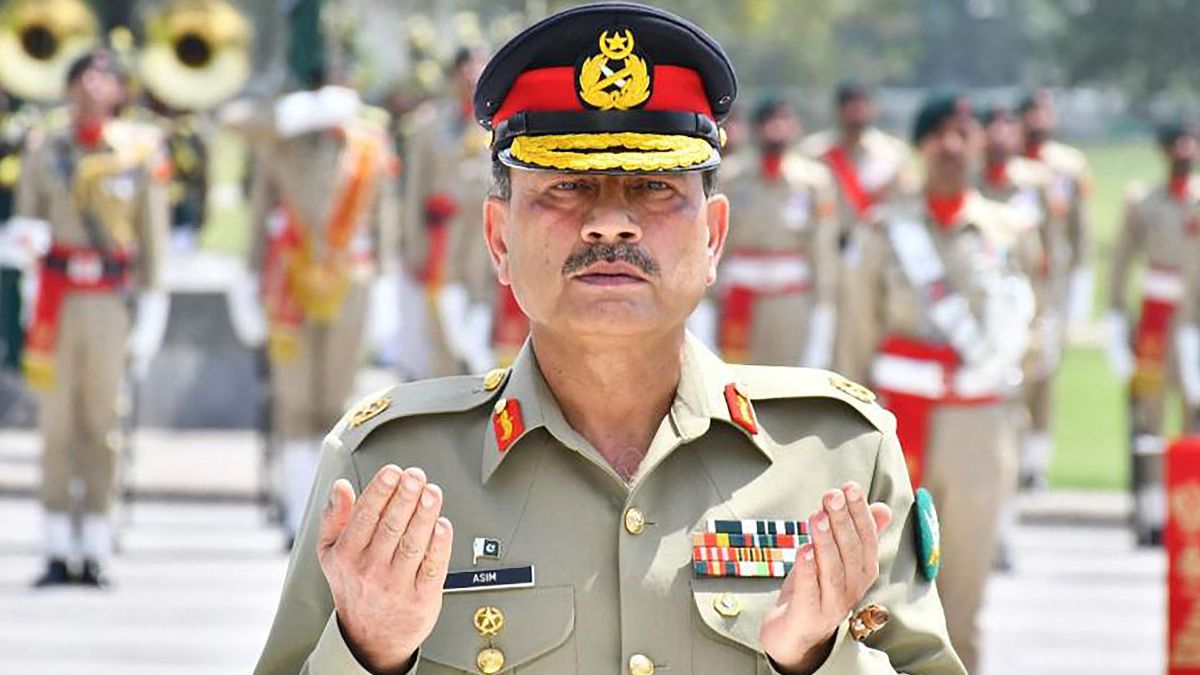Pakistani Army Chief Asim Munir is once again spewing hate against India.
At a recent address in Karachi, Munir accused India, without any evidence, of causing tensions in the Kashmir region after the April 22 terror attack in Pahalgam.
This is not the first time Munir has spoken out against India.
ALSO READ | Asim Munir: The son of an Imam, a ‘muhajir’, and Pakistan Army chief who ‘triggered’ Pahalgam terror attack
Earlier, after the Pahalgam attack, intelligence officials said that a speech by Munir, where he called Kashmir the “jugular vein of Pakistan,” may have triggered the terror attack that killed 26 tourists in Jammu and Kashmir.
So, what did Munir say this time? And what exactly did he say earlier that some intelligence officers believe may have led to the Pahalgam terror attack?
Let’s take a look:
What did Asim Munir say?
In a speech at the Pakistan Naval Academy in Karachi, Munir once again tried to defend Pakistan’s support for terrorism, calling it a “legitimate struggle”.
He accused India of attacking Pakistan twice without provocation, describing it as a “troubling absence of strategic foresight”.
He went on to blame India for rising tensions in the region and warned of a strong reply if there is any future aggression.
“Pakistan, despite grave provocations, acted with restraint and maturity, and demonstrated its commitment to regional peace and stability, which has led to Pakistan’s role as a net regional stabiliser,” Munir said.
Impact Shorts
More ShortsHe also raised the Kashmir issue, claiming, “Pakistan is a strong advocate for a just resolution of the Kashmir issue in accordance with United Nations resolutions and the aspirations of the Kashmiri people.”
He called for a “just and peaceful resolution” to the Kashmir matter to ensure lasting peace in the region.
Senior intelligence officials told CNN-News18 that Munir’s latest remarks reflect his growing frustration.
They believe his comments are aimed at justifying Pakistan’s ongoing proxy war in Kashmir, while also using anti-India statements to gain greater control over the Navy.
His remarks seemed to be an attempt to assert Pakistan’s stance on continuing proxy warfare in Kashmir while trying to secure control over the Navy through anti-India rhetoric, they said.
“The context for Munir’s speech stemmed from India’s aborted Karachi strike, which showcased India’s capability for strong diplomacy through maritime dominance. This display of power forced Pakistan to de-escalate,” sources told CNN-News18.
They also said, “Munir’s ambitions are much broader, posing a wake-up call for Pakistani politicians. He aims to expand his influence significantly, leveraging anti-India rhetoric to consolidate power.”
Earlier, India had launched Operation Sindoor against terror camps in Pakistan, leading to four days of cross-border tensions. India struck several air bases and pushed back missile and drone attacks effectively, dealing a major blow to the Pakistan Army.
More than 100 terrorists were killed in the operation, including senior commanders such as Jaish-e-Mohammed leader Abdul Rauf Azhar and family members of Masood Azhar.
ALSO READ | Why did Pakistan’s Asim Munir get promoted despite losing to India?
What did he say last time? Did his ‘jugular vein’ speech trigger Pahalgam terror attack?
On April 16, while addressing the Overseas Pakistanis Convention in Islamabad, Asim Munir spoke about Kashmir, saying, “Our stance is absolutely clear, it was our jugular vein, it will be our jugular vein, we will not forget it. We will not leave our Kashmiri brothers in their heroic struggle.”
He told the audience, made up of Pakistanis living abroad, that they were the country’s ambassadors and must remember they belong to a “superior ideology and culture”.
According to intelligence officials who spoke to CNN-News18, Munir’s speech about Kashmir, the two-nation theory, and the supposed civilisational divide between Hindus and Muslims may have catalysed the Pahalgam terror attack.
Several officials familiar with the assessment told the media outlet that his comments, especially those about the “differential treatment” of Hindus and Muslims, may have emboldened militant groups such as ‘The Resistance Front (TRF)’, a proxy of ‘Lashkar-e-Taiba’, which later claimed responsibility for the attack.
The report, quoting intelligence sources, said that Munir’s references to religious differences could have motivated the TRF to target tourists in Pahalgam’s Baisaran Valley based on their religion.
Pahalgam terror attack
On the afternoon of April 22, terrorists opened fire in the Baisaran Valley, a popular tourist spot often called “mini Switzerland”, located in Pahalgam.
At least 26 people were killed in the attack, most of them tourists. Among the dead were 25 Indian nationals and one person from Nepal, according to police.
It was the deadliest civilian attack in India since the 2008 Mumbai terror strikes, which had left over 160 people dead.
In response, India launched ‘Operation Sindoor’ on the night of May 6 and 7, targeting and destroying several terror sites in Pakistan and Pakistan-occupied Kashmir.
Pakistan then attempted retaliatory strikes on Indian military bases on May 8, 9, and 10, but the Indian side responded strongly.
The clashes ended after the directors general of military operations of both countries held discussions on May 10 and agreed to halt further military action.
With inputs from agencies
)